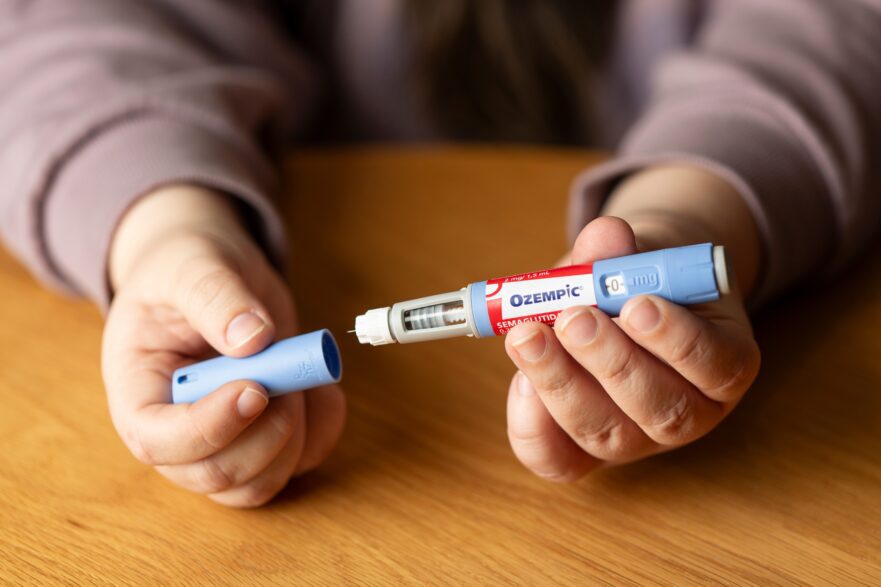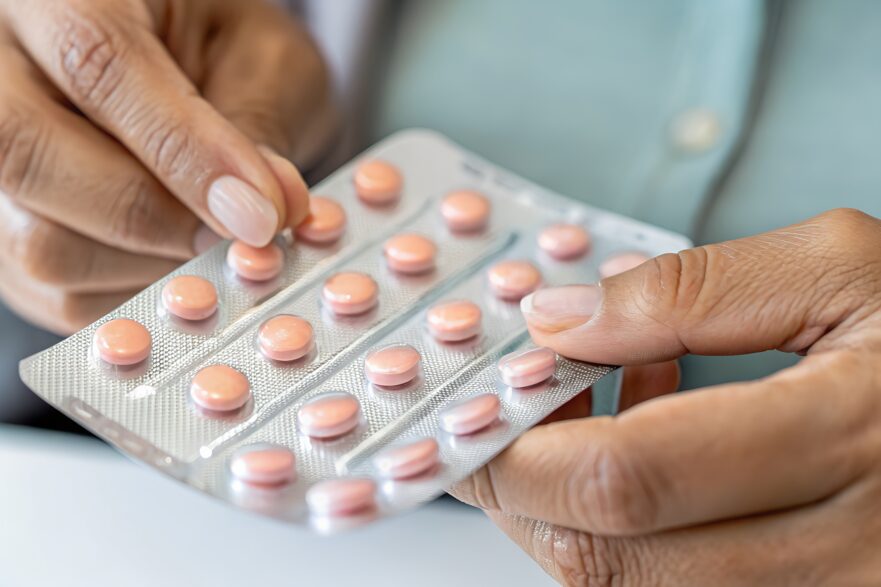
Life on SSRIs: The Good, the Bad, and the Complicated

From life-saving results to life-altering side effects, real people share what it’s like to use antidepressants

Share
on this page:
SRIs — among the most widely prescribed drugs in the U.S.— have seen a steady rise in use since their debut in the 1980s. This class of medications is considered the first-line drug therapy for conditions including depression, anxiety, obsessive-compulsive disorder (OCD), panic attacks, post-traumatic stress disorder (PTSD), and more. The most commonly prescribed SSRIs include fluoxetine, sertraline, paroxetine, fluvoxamine, citalopram, escitalopram and vilazodone.
Large-scale trials indicate that roughly 50% of people who take antidepressants will notice improvements in depression symptoms within eight weeks — compared to 30% who report improvement with a placebo. Given how challenging mental health conditions can be to treat, many experts see these numbers as evidence of success.
“They’re very effective,” says Rahn Bailey, M.D., President Elect of the Black Psychiatrists of America (BPA), who notes that psychiatry itself has also improved when it comes to measuring the improvements of these drugs.
“SSRIs are generally very safe and don’t cause [fatal] overdose,” adds Dr. Bailey. Even when taken in higher-than-prescribed amounts, they are unlikely to be lethal. The risk of overdose is primarily a concern in patients whose mental health condition may compromise cognitive function, he continues.
SSRIs work by increasing levels of serotonin, a neurotransmitter that helps regulate mood. SSRIs block the reabsorption of serotonin into neurons, making more of it available in the brain. (While this mechanism has been shown to improve mood in some individuals, the exact relationship between serotonin levels and mental health is complex and not fully understood.)
These drugs have played a critical role in the treatment of depression for many of the nearly 30% of American adults who have been diagnosed with this condition at some point in their lives, as well as the 19% who have experienced an anxiety disorder over the last 12 months. However, like all drugs, SSRIs bring the risk of side effects — from the mild and common (indigestion or headaches) to the serious and rare (persistent erectile dysfunction or protracted withdrawal).
Here’s a look at six people’s experiences with SSRIs, and how this medication changed their life for the better, the neutral, and the worse.
Cassi, San Diego, California
Drug: Zoloft (Sertraline)
Indication for use: Anxiety, OCD, and eating disorders
Duration: 12 years, ongoing
Current age: 29
Side effects: Frequent urination early on; withdrawal symptoms when doses are missed
At age 16, Cassi [last name withheld for privacy reasons] was in crisis. Struggling with OCD, severe anxiety, and an eating disorder, her pediatrician and parents encouraged her to start Zoloft. “It wasn’t really my decision,” she says. Having just entered inpatient treatment for an eating disorder, her doctor advised that the medication would be essential to recovery.
Though skeptical at first — concerned that the drug might cause weight gain or numb her feelings — Cassi agreed to start on a low dose (25 mg). Within a few months, she had gradually increased her dosage up to 200 mg, the maximum safe dose for her size. “I didn’t gain weight, but I did have to pee all the time at first,” she says. The real change, she says, was that “little things would stop bothering me as much; like being around fast food [a major trigger] didn’t freak me out anymore.”
Cassi says Zoloft helped lower the intensity of her anxiety enough to make recovery possible. “It was the best thing that ever happened to me,” she says. Over the next few years, Cassi underwent intensive inpatient and outpatient treatment for her eating disorder, both of which included intensive one-on-one, group, and family therapy, eventually making a full recovery. She went on to become a collegiate athlete and pursue a professional career in medical device sales — all while remaining on the same dose of Zoloft.
Recently, Cassi (now in her late 20s and dating to find a life partner) considered coming off the medication due to concerns about future fertility (research is mixed on whether sertraline makes it more difficult to become pregnant), along with the inconvenience of needing to take a drug every day. However, when she misses even one dose because she can’t pick up her prescription in time, she says she experiences severe withdrawal symptoms, including nausea, night sweats, sensitivity to light, and debilitating headaches.
At one point Cassi started to taper off her medication with the help of her psychiatrist, but ultimately decided to resume her full dose. While she didn’t experience withdrawal, her anxiety came surging back. “Even going down by 50 mg made me cry all the time,” she says.
Still, she hasn’t ruled out weaning off Zoloft someday. “If I ever do come off it, it’ll have to be when my life is in a very stable place,” she says.
Stephen Cavaliero, New York City, New York
Drug: Lexapro (Escitalopram)
Indication for use: Generalized anxiety
Duration: 15+ years, now discontinued
Current age: 39
Side effects: Dry mouth, night sweats, delayed ejaculation during first course of drug; severe post-SSRI symptoms after second course, including complete loss of sexual and emotional function
Stephen Cavaliero first went on Lexapro as a junior at the University of Pennsylvania. “I wasn’t doing a great job of managing my finances and had some family troubles,” says Cavaliero, explaining that these issues triggered anxiety. His father sent him to a psychiatrist who suggested Lexapro along with talk therapy.
Cavaliero agreed to try it, starting at 10 mg and eventually increasing to 20 mg. “The tightness in my chest reduced,” he says. The only side effects were dry mouth, increased sweating, and a delay in ejaculation. “I was just having sex for longer — not a bad thing for a young college guy,” he says.
After graduation, Cavaliero moved to New York and stayed on Lexapro. He didn’t feel a strong need for the drug: “I wasn’t in therapy anymore, but I kept taking it.”
Share Your Antidepressant Story
Have you or someone you know used an antidepressant medication? We want to hear your story. Share your experiences in the Comments or connect with us directly by emailing editorial@medshadow.org or messaging us on Instagram @medshadowfoundation.
Everyone’s journey with these drugs is different, and your insights could help others who are navigating similar experiences. And remember — while personal stories are powerful, medical decisions should always be made with guidance from your healthcare provider.
In 2023, he stopped. As a successful freelance filmmaker with an active social life and a passion for yoga and jujitsu, his life was in a good place. The taper was slow (about two months) and symptom-free. For nearly a year, he felt fine. Then, a major life event — a breakup which caused a housing issue — triggered a resurgence of anxious feelings and a tightness in his chest. Cavaliero restarted Lexapro, this time 10 mg through a general practitioner.
That’s when everything changed.
After a few days, he noticed night sweats and insomnia. Within a week, Cavaliero discontinued use due to the lack of sleep. Almost immediately, he realized he had lost all sexual function. “I couldn’t get an erection at all. Zero,” he said. “Things got worse and worse and worse.”
Cavaliero says he has lost all sexual feeling (both desire and physicality), his ability to work out has suffered, and he struggles to feel even familial love; all of which he attributes to SSRIs.
Nearly two years later, the symptoms haven’t resolved: “It’s complete impotence and a loss of all your emotions. The current status of existence is basically staring at a brick wall.”
Cavaliero met with numerous doctors who he found to be “extremely dismissive.” One urologist told him that he was just experiencing performance anxiety, a sexual medicine doctor denied the possibility that his symptoms were worsening, and a psychiatrist informed him that he was suffering from depression unrelated to SSRIs. Cavaliero has also tried prescriptions for erectile dysfunction, including Viagra and Cialis, with little success. He’s also connected with online support groups exploring post-SSRI sexual dysfunction (PSSD), a rare but devastating syndrome with no established treatment.
Cavaliero says he wants people to understand that what he is going through is real. “The exact same medication, which did not cause me a problem for a very long time, was reintroduced and it caused total destruction.”
Cyrus*, Arizona
Drug: Celexa (Citalopram)
Indication for use: Panic attacks, anxiety
Duration: 4+ years, ongoing
Current age: 40s
Side effects: None reported
Ever since he was 19, Cyrus [name changed for privacy purposes] dealt with his off-and-on panic attacks without medication. But in early 2020, the high school teacher reached a breaking point. “It happened when I was teaching a class and I had to ask another teacher to cover for me,” he recalls. The attacks continued to arise in the classroom. “It was just a nightmare scenario. I couldn’t do my job,” he says. He tried to self-manage with Benadryl and propranolol (a beta-blocker, which is sometimes prescribed off-label for anxiety) purchased through an online telehealth service, but neither helped.
Ultimately, Cyrus went to his primary care provider and agreed to try an SSRI: Celexa. He started on 20 mg and later increased to 40 mg, noticing subtle benefits early on. “I felt like I was wearing a little bit of brain armor [against panic attacks],” he says. To complement the prescription, Cyrus also started meditating (with an online app), exercising (including following a couch-to-5K running program), and implementing techniques from books on the subject.
Though the COVID stay-at-home order disrupted his ability to gauge whether the drug was working in a live classroom setting, once in-person teaching resumed, the difference was clear. “It just never happened again,” he says. “Teaching became easy and fun again. I’ve never had another panic attack.” Cyrus, who continues to teach and lives in Arizona with his wife and two young children, hasn’t experienced any side effects and hasn’t seriously considered tapering. “It’s just like a vitamin now,” he says. “If I’d felt any side effects, I’d revisit it. But I haven’t. I don’t feel any duller. It just feels like something is making it harder for me to have panic attacks.”
Amanda Burnett, South Carolina
Drug: Lexapro (Escitalopram)
Indication for use: Panic attacks, anxiety
Duration: 8 years, currently tapering
Current age: 30
Side effects: Memory issues, irritability, depersonalization; withdrawal symptoms including a racing heart, insomnia, hallucinations
At age 22, Amanda Burnett was a newly minted ICU nurse at a Level 1 trauma center and deeply in grief from the unexpected loss of her brother just a year prior. During her first week of orientation in her new role, she experienced her first-ever panic attack in the middle of an emergency simulation. “I stopped being able to hear what anyone was saying,” she recalls. “I froze. I was shaking. It was like my whole body shut down.”
Worried the anxiety would cost her the career she had worked so hard for, Burnett saw a new primary care doctor and was quickly prescribed 10 mg of Lexapro. “There was no discussion of maybe changing my diet or my sleep, both of which were trash in my early 20s,” she says. “It felt like a Band-Aid.”
Initially, Lexapro caused only mild side effects of drowsiness and brain fog. She says the medication helped her push through the intense demands of ICU nursing. “I was like superwoman,” she says. “I could take on even the sickest patient and be fine.” But after three or four years on the medication, things began to shift. Burnett says she started having trouble remembering words, finishing sentences, and focusing. At first, she blamed exhaustion. “I was working 12-hour shifts,” she says. “But I eventually realized I was 100 percent not myself.” She started noticing increasingly erratic behavior, including impulsive spending, binge drinking, and intense road rage. [Impulsivity, aggression, and hostility are all documented side effects of SSRIs].
It wasn’t until she visited a brain health clinic (a specialized medical facility focused on brain functioning) in 2022 — paying thousands of dollars out-of-pocket for a scan — that Burnett first heard that Lexapro could be contributing to these symptoms. “They told me parts of my brain were basically ‘sleepy,’ likely due to the SSRI,” she says. She began to taper with the help of a psychiatrist, but found the process much harder than she had been warned.
Her first taper attempt, dropping from 10 mg to 2.5 mg over two months, led to insomnia, excessive sweating, feeling disconnected from her body, and something she now knows was POTS, a form of the nervous system disorder dysautonomia. “One day I looked in the mirror and my eyes looked totally different,” she says, remembering an intense episode of depersonalization. Burnett developed auditory hallucinations, night-time adrenaline surges, agoraphobia, and circulation issues. “I went from lifting weights daily to barely being able to take a walk. I’d open the blinds and just wish I could go outside.”
Now 30, Burnett has spent over a year doing a slow micro-taper under the guidance of a peer coach. It’s taken her two and a half years to get to 3.28 mg (she mixes her own daily liquid dose)—progress she’s proud of. “I’m starting to feel more like myself. I’ve regained emotions I hadn’t felt in years.”
Burnett has also become an advocate. She sits on the medical advisory board for the Antidepressant Coalition for Education, which recently submitted a petition to the FDA requesting warning labels for SSRIs about the risk of protracted withdrawal, and she uses her TikTok platform @thatfunctionalnurse to share her story. She explains that she thinks SSRIs are helpful for some people, but she wants greater awareness about potential side effects. “I had no idea what I was signing up for — and I was a nurse,” she says.
Caitlyn Smith, Boise, Idaho
Drug: Lexapro (Escitalopram)
Indication for use: Depression, anxiety
Duration: 5+ years, ongoing
Current age: 38
Side effects: Headaches during the first six weeks
Caitlyn Smith spent nearly a decade resisting the idea of antidepressants. “Therapists had been gently suggesting it for years,” she says. “But I kept thinking, no, I should be able to handle this on my own.” That changed in July 2020. After struggling with on-and-off depression, chronic drinking, as well as a recent COVID-related layoff and a diagnosis of dystonia (a neurological disorder that left her barely able to walk), Smith hit what she describes as rock bottom. “I got really drunk. The next day, I looked at my husband and said, ‘I need more help than what I can give myself.’”
She saw her primary care doctor, who knew Smith was already in therapy, and was prescribed 10 mg of Lexapro. At the same time, she quit drinking, started more regular therapy, and began a 12-step program.
During the first few weeks on the medication, Smith experienced persistent headaches that felt like a mix of dehydration and brain fog. “I couldn’t focus,” Smith says. However, she was comforted by the fact that a close friend had experienced the same initial symptoms. “I just waited it out.” After 6 or 8 weeks, the headaches stopped.
During this time, Smith also noticed that her emotional lows weren’t as devastating. “It took the edge off just enough. I still had bad days, but it didn’t feel like everything was ending.” In parallel, Smith also treated her dystonia with assistance from a chiropractor, physical therapist, acupuncturist, and BOTOX injections in her back — however, she says that it eventually improved on its own.
Smith credits much of her mental health improvement not just to the medication, but to everything she did around it. Therapy sessions included Eye Movement Desensitization and Reprocessing (EMDR, a psychotherapy approach that has patients recall trauma while engaging in certain eye movements) to address trauma, while she says her 12-step work helped “understand my triggers and where I can grow.”
When Smith became pregnant for the first time in 2021, her ob-gyn was fully supportive of her decision to stay on Lexapro. “She was very much of the idea that mom’s mental health comes first.” Still, Smith experienced postpartum depression. “There were nights I’d be making dinner and just collapse onto the floor sobbing,” she recalls. In 2023, Smith experienced another major life change when her father passed away. She says she doesn’t think she’d have “been able to go through” either experience without the support of Lexapro, sobriety, and the 12-step program.
Now in her late 30s and with a second child, Smith says she’s no longer worried about whether she’ll be on Lexapro forever. “Maybe I’ll go up. Maybe I’ll go down. Maybe I’ll stay the same. But right now, it’s helping me have a really good life.”
Lee, Tucson, Arizona
Drug: Fluoxetine (generic Prozac)
Indication for use: Depression, mood instability
Duration: 3+ years, ongoing
Current age: (Did not disclose)
Side effects: Possible mild sexual dysfunction, not confirmed
Lee had long resisted the idea of taking an SSRI. Growing up, she’d watched her father struggle to find the right medication for his depression. “It turned me off of wanting to go through that process,” she says. “And I kept worrying that taking anything was going to make me go through life falsely happy.”
But years of emotional strain — including the deaths of both parents, relocating to a new city, and weathering the pandemic — took a toll. Lee had entered into a serious relationship with her now-wife and saw the effect erratic mood swings had on their relationship. “I asked her, do you want me to try medications in the goal of making my dark days less dark?” Lee recalls. Her partner supported her, but left the decision entirely in Lee’s hands.
Lee started on a very low dose (5 mg) of fluoxetine, prescribed by her primary care physician with a referral from her therapist. Lee says she experienced no side effects initially and did not experience the fake positivity that she feared. “I was just more level, specifically in my home life,” she says. After a few months, she increased her dose slightly to 10 mg.
“It was not like I had an awareness of things being better, but I had a notable awareness of things not being as bad,” she says. “There were fewer days where I had to withdraw or was just gloomy, and more days where I could show up as my best self.”
That emotional stability proved essential when Lee was diagnosed with breast cancer in 2024 and began intensive treatment that included chemotherapy, radiation, and a double mastectomy. “It was so depressing and intense,” she says. While the treatment has been grueling, she credits the medication, her cancer-focused therapist, and prescription for lorazepam to help manage procedure-related anxiety with helping her get through: “Drugs help.”
Though she’s noticed possible mild sexual side effects, Lee hasn’t confirmed a direct connection with Fluoxetine. “It has not impacted my sexual life with my partner to a point that bringing back bad moods would be worse.”
Today, Lee has completed her treatments, and even founded a cheeky breast-cancer awareness brand Yeet that Teet in the process. She’s confident in her decision to start mental health medication. “It makes it easier for me to navigate this world,” she says. “It’s not about sh**ing rainbows. It’s just about being stable.”
Understanding the Risks and Benefits of SSRIs
The decision to take an SSRI is very personal. As our stories illustrate, no two individuals and situations are the same. If you are living with a mental health condition like depression or anxiety, it’s critical to find a provider you trust who will take the time to explain the benefits, risks, and side effects — and create a treatment plan that works for you.
When discussing possible SSRI use with a patient, Fernando Espi Forcen, M.D., Ph.D., medical director of the Depression Residential Treatment Program at McLean Hospital, says he explains how someone might feel on the medication: “I use descriptions from patients such as ‘it makes me calmer’ or ‘things don’t bother me as much.’ But also that some patients report feeling too numb.” Dr. Forcen explains he also reviews the side effects, possible drug-drug interactions, evidence around dosage, and timelines. “I find that patients find it helpful to know that they won’t have to stay forever on an SSRI. We can eventually switch, add other medicines, and taper off depending on the different possible clinical outcomes.”
The side effects Dr. Forcen says he sees most often are headache and gastrointestinal issues, including nausea and diarrhea, both of which typically remit within the first few weeks. After that, sexual side effects (lack of libido, erectile dysfunction, difficulty with orgasm) are the most prevalent — often those do not subside until the patient discontinues use. Although, as noted in Cavaliero’s case, there is a risk that these issues persist. One large 19-year retrospective cohort study published in 2023 found that 0.46% (4 out of 866) of male patients experienced erectile dysfunction that did not respond to treatment with PED5 inhibitors for at least one month after stopping antidepressants
Protracted withdrawal syndrome (PWS) – the term for what Burnett experienced – is also not an isolated incident. While there’s no good data on the prevalence of this rare issue, studies have found that subjects report withdrawal symptoms, including sleep problems, “brain zaps,” muscle aches, and cognitive impairments, some lasting 10 years or more. Dr. Forcen says that weight gain (people on escitalopram see an average 0.9-pound weight gain over six months) and heart rhythm changes can also be concerns (the data is mixed on whether or not SSRIs increase the overall risk of serious cardiac rhythm problems).
For people who are pregnant or trying to become pregnant, SSRI use can be difficult to navigate. According to MothertoBaby, the research organization cited as a suggested resource by both the FDA and CDC, it is not known whether SSRI use affects fertility in women. While one 2023 study found that there is a slightly lower chance of getting pregnant while taking SSRIs, there is inconclusive evidence, and untreated depression may also affect fertility.
For patients on an SSRI who become pregnant, the American College of Obstetricians and Gynecologists recommends remaining on the medication. One recent meta-analysis found SSRIs may have a small impact on increased risk of issues including pre-eclampsia, preterm delivery, postpartum hemorrhage, and NICU admissions, but it found the absolute risk to be low.
Despite these potential side effects and risks, experts emphasize that SSRIs can be a highly effective part of a broader treatment plan, especially when paired with other interventions. Pharmaceutical treatments may be most beneficial in treating illnesses like depression when paired with therapeutic interventions, including psychotherapy or meditation, as well as lifestyle interventions like physical activity, diet, and socialization.
“I think prescribing in general, SSRIs or otherwise, is always weighing the pros and cons,” says Anna Pappas, board-certified psychiatric-mental health nurse practitioner (PMHNP) with UC San Diego Health. “And I think it’s important to remember that we’re not comparing these medications to an ideal situation where there’s no illness. We’re comparing them to the effects of untreated or undertreated mental illness.”
Want more first-person accounts of what it’s really like to live with the side effects of popular medications? Don’t miss Life on Ozempic: The Good, the Bad, and the Complicated.
- MedlinePlus; National Institute of Mental Health. (2023, August). Commonly prescribed antidepressants and how they work. NIH MedlinePlus Magazine.
- Brody, D. J., & Gu, Q. (2020, September). Antidepressant use among adults: United States, 2015–2018 (NCHS Data Brief No. 377). National Center for Health Statistics.
- Hillhouse, T. M., & Porter, J. H. (2015, February). A brief history of the development of antidepressant drugs: From monoamines to glutamate. Experimental and Clinical Psychopharmacology, 23(1), 1–21
- Chu, A., & Wadhwa, R. (Updated May 1, 2023). Selective Serotonin Reuptake Inhibitors. In StatPearls [Internet]. Treasure Island (FL): StatPearls Publishing; began January 2025. Retrieved from
- Institute for Quality and Efficiency in Health Care (IQWiG). (2024, April 15). Depression: Learn more – How effective are antidepressants? In InformedHealth.org [Internet]. Cologne, Germany: Institute for Quality and Efficiency in Health Care (IQWiG)
- Ballenger, J. C. (2000, June). Anxiety and depression: Optimizing treatments. Primary Care Companion to the Journal of Clinical Psychiatry, 2(3), 71–79.
- Mayo Clinic Staff. (n.d.). Selective serotonin reuptake inhibitors (SSRIs). Mayo Clinic. Retrieved August 13, 2025
- Barbey, J. T., & Roose, S. P. (1998). SSRI safety in overdose. The Journal of Clinical Psychiatry, 59(Suppl 15), 42–48
- Witters, D. (2023, May 17). U.S. depression rates reach new highs. Gallup News. Retrieved August 13, 2025
- National Institute of Mental Health. (n.d.). Any anxiety disorder. Retrieved August 13, 2025
- NHS 24. (2024, September 27). Selective serotonin reuptake inhibitors (SSRIs). NHS inform. Retrieved August 13, 2025
- Ben‑Sheetrit, J., Hermon, Y., Birkenfeld, S., Gutman, Y., Csoka, A. B., & Toren, P. (2023, April 21). Estimating the risk of irreversible post‑SSRI sexual dysfunction (PSSD) due to serotonergic antidepressants. Annals of General Psychiatry, 22(1), Article 15.
- Henssler, J., Heinz, A., Brandt, L., & Bschor, T. (2019, May 17). Antidepressant withdrawal and rebound phenomena. Deutsches Ärzteblatt International, 116(20), 355–361.
- Organization of Teratology Information Specialists (OTIS). (2023, August). Sertraline (Zoloft®). In MotherToBaby Fact Sheets. Brentwood (TN): Organization of Teratology Information Specialists. Retrieved August 13, 2025
- Hengartner, M. P., Schulthess, L., Sørensen, A., & Framer, A. (2020, December 24). Protracted withdrawal syndrome after stopping antidepressants: A descriptive quantitative analysis of consumer narratives from a large internet forum. Therapeutic Advances in Psychopharmacology, 10, 2045125320980573
- Mouawad, M., Nabipur, L., & Agrawal, D. K. (2025). Impact of antidepressants on weight gain: Underlying mechanisms and mitigation strategies. Archives of Clinical and Biomedical Research, 9(3), 183–195
- Aakjær, M., Werther, S. K., De Bruin, M. L., & Andersen, M. (2022, September). Serious arrhythmia in initiators of citalopram, escitalopram, and other selective serotonin reuptake inhibitors: A population‑based cohort study in older adults. Clinical and Translational Science, 15(9), 2105–2115
- Organization of Teratology Information Specialists. (2023, August 1). Sertraline (Zoloft®). In MotherToBaby | Fact Sheets [Internet]. Brentwood (TN): Organization of Teratology Information Specialists. Retrieved August 13, 2025
- Casilla‑Lennon, M. M., Meltzer‑Brody, S., & Steiner, A. Z. (2016, September). The effect of antidepressants on fertility. American Journal of Obstetrics and Gynecology, 215(3), 314.e1–314.e5
- Organization of Teratology Information Specialists. (2024, January). Depression [Fact sheet]. MotherToBaby | Fact Sheets [Internet]. Brentwood (TN): Organization of Teratology Information Specialists. Retrieved August 13, 2025
- American College of Obstetricians and Gynecologists. (2024, March). Anxiety and pregnancy [Frequently asked questions]. Retrieved August 13, 2025
- Lebin, L. G., & Novick, A. M. (2022, November). Selective serotonin reuptake inhibitors (SSRIs) in pregnancy: An updated review on risks to mother, fetus, and child. Current Psychiatry Reports, 24(11), 687–695
- National Institute for Health Research. (2020, July 3). Combined drug and psychological therapies may be most effective for depression [NIHR Alert]. Retrieved August 13, 2025
- Georgetown University Medical Center. (2022, November 9). Mindfulness-based stress reduction is as effective as an antidepressant drug for treating anxiety disorders [News release]. Retrieved August 13, 2025
- Mayo Clinic Staff. (2023, December 23). Depression and anxiety: Exercise eases symptoms. Mayo Clinic. Retrieved August 13, 2025
- Selvaraj, R., Selvamani, T. Y., Zahra, A., Malla, J., Dhanoa, R. K., Venugopal, S., Shoukrie, S. I., Hamouda, R. K., & Hamid, P. (2022, December 9). Association between dietary habits and depression: A systematic review. Cureus, 14(12), Article e32359.
- Elmer, T., & Stadtfeld, C. (2020, January 29). Depressive symptoms are associated with social isolation in face-to-face interaction networks. Scientific Reports, 10, Article 1444.
DISCLAIMER: MedShadow provides information and resources related to medications, their effects, and potential side effects. However, it is important to note that we are not a substitute for professional medical advice, diagnosis, or treatment. The content on our site is intended for educational and informational purposes only. Individuals dealing with medical conditions or symptoms should seek guidance from a licensed healthcare professional, such as a physician or pharmacist, who can provide personalized medical advice tailored to their specific circumstances.
While we strive to ensure the accuracy and reliability of the information presented on MedShadow, we cannot guarantee its completeness or suitability for any particular individual’s medical needs. Therefore, we strongly encourage users to consult with qualified healthcare professionals regarding any health-related concerns or decisions. By accessing and using MedShadow, you acknowledge and agree that the information provided on the site is not a substitute for professional medical advice and that you should always consult with a qualified healthcare provider for any medical concerns.
on this page:
DONATE:
Help fund our fight for improved medication safety and transparency by supporting our independent journalism.
Give NowStay Informed. Sign up for our newsletters.
Independent, science-based journalism delivered directly to your inbox.
About Our Advocacy:
We seek to create a world where there are safer medications for all and where all people are fully informed about their medication benefits and side effects, using our explanatory and investigative journalism to both inform and stimulate public discussion to drive toward solutions.
WEBINARS
Want to hear expert insights about medication safety and other care options? Watch all our past webinars and sign up for upcoming ones.
WATCH Now


